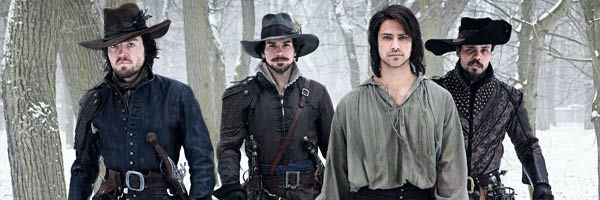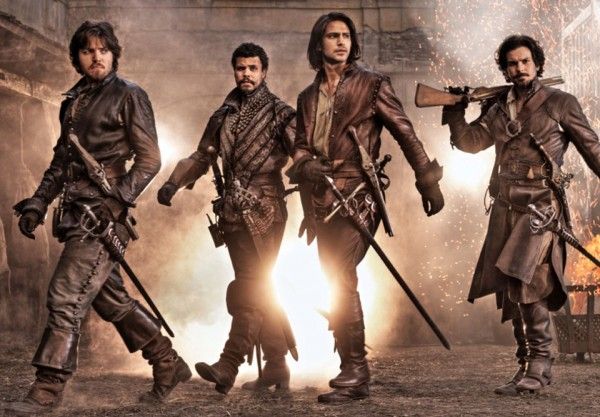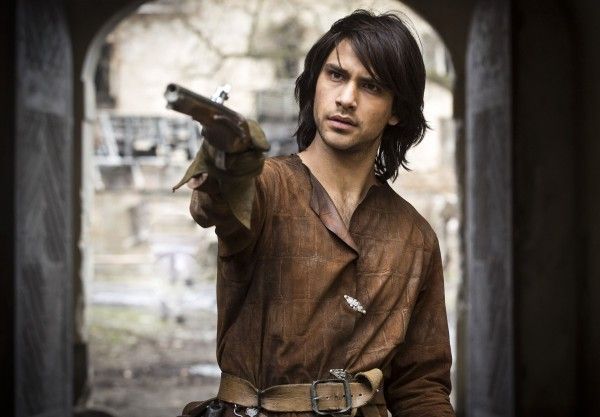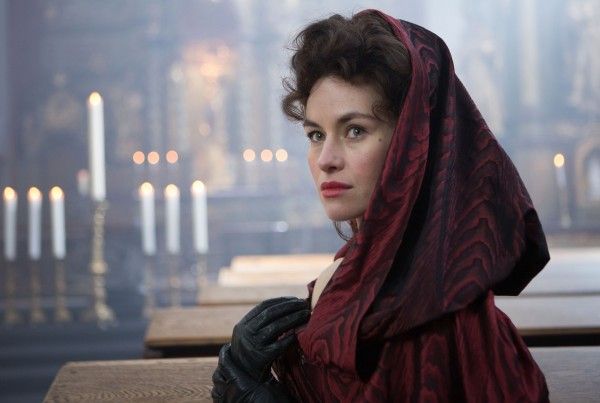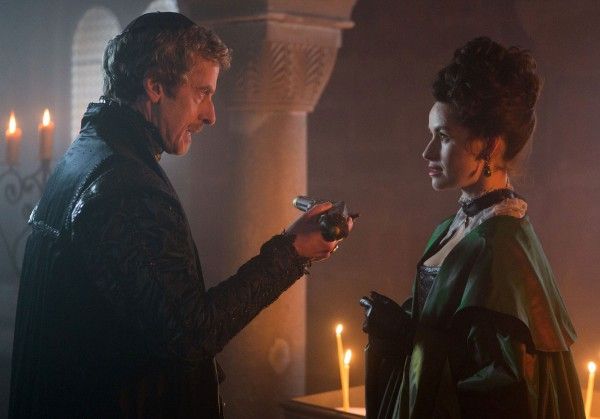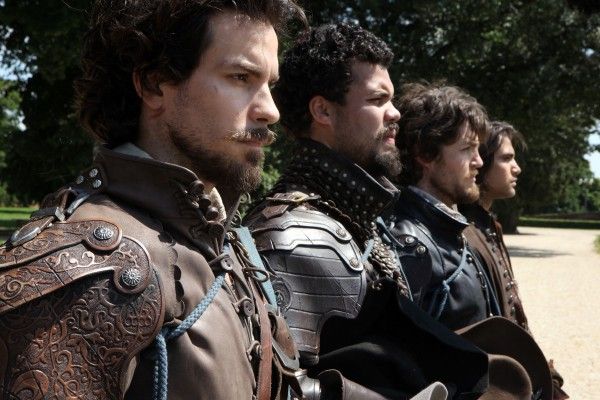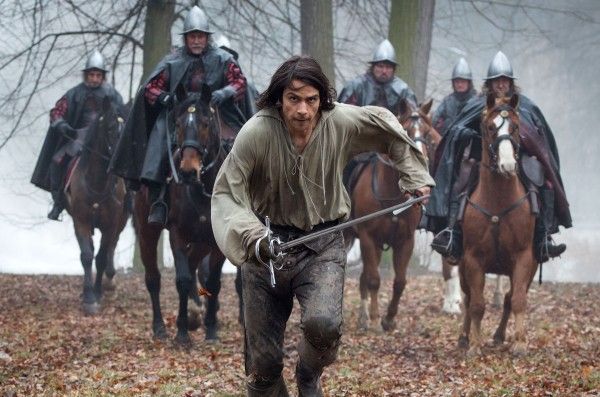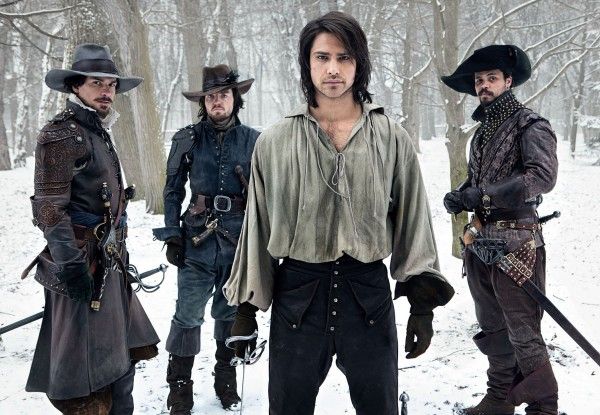The Musketeers, airing on BBC America, is set on the streets of 17th century Paris, before law and order reigned. As a result, King Louis XIII’s personal bodyguards, Athos (Tom Burke), Aramis (Santiago Cabrera) and Porthos (Howard Charles), stand for social justice, honor and valor. Created by Adrian Hodges (Primeval), the show also stars Luke Pasqualino, Peter Capaldi, Maimie McCoy, Tamla Kari and Hugh Speer.
During this exclusive interview with Collider, co-stars Luke Pasqualino and Maimie McCoy, along with executive producer/writer Adrian Hodges, talked about what made them want to take on The Musketeers, how crucial the chemistry was among the actors, not going too over-the-top with the humor, making sure the villains feel very real, how challenging it is to find the right directions for such a blend of genres, how challenging the physical aspects of these roles are, favorite action scenes and episodes, and how they’re always thinking ahead to future seasons. Check out what they had to say after the jump.
Collider: Adrian, what was it that made you want to take on The Musketeers?
ADRIAN HODGES: The BBC came to me and they wanted to adapt the book again, in the straightforward way, and I said no to that. I didn’t want to do that. But what I did want to do was have a real look at the adventure genre because I thought it was ripe for reinvention. So, what we did was spend nearly six months exploring the tone of the show that we wanted to do. I decided, very early on, that although we’d be influenced by the book and aware of the book, and the characters are based on the characters in the book, we wouldn’t adapt the book. It’s all new stories. That’s really the way we looked at it, and that’s the challenge and fun of it. We wanted to take what people love about The Musketeers, but make it fresh and new.
Were there specific themes and ideas that you wanted to explore?
HODGES: Yes, absolutely! They’re classic themes, which is why I think it’s such a great story to look at again. The concept of being loyal to your friends, to the point where you’d even die for them, is a great subject. The situation that women were in, at the time, was something that Dumas doesn’t really go into, but it’s a great subject to look at. It’s a great genre because you can do a lot. Sometimes in thrillers, you can really explore things, and it’s the same in this genre. You can use the fun of the genre, but I also really wanted to come at it from the point of view of some really complex characterization. There was a lot that I wanted it to do, and I wanted it to be fun. It’s fun, but it’s not simple fun.
Luke and Maimie, what drew you to this, as actors?
LUKE PASQUALINO: I had no hesitation, whatsoever. As soon as I got sent the first script by our casting director, I read it. Normally, when I read a script, I read 30 pages, and then go have a cup of tea and come back. And then, I read 20 pages and go make a phone call, and then go back to it. With this, 10 pages in, I just wasn’t going anywhere else until page 60. I absolutely loved it, and I loved the way the character of D’Artagnan had been portrayed. I was just well up for it. So, I went in and met (director) Toby [Haynes], and as soon as I got into that room, to see how excited everybody was to get this underway and onto the set, it just drew me to it, even more. It was an instant attraction, so I was delighted when I got the offer.
MAIMIE McCOY: I went on that first audition with Toby, and his approach and his energy, filming it, had me up on my feet and really physical. I was exhausted, at the end of it, and that actually captured the attack, the pace, the tension, the wit and the sparkle that it’s got. That was brilliant, having read that and felt all of those things, and then to get in the room and feel the energy have that punch to it, which set it rolling and got me incredibly excited.
HUGHES: We talked about it, a lot. We wanted to get all of the joy of the swashbuckler and adventure genre, but with the intensity of a tougher style, as well. We want it to feel really modern, in the way that it’s made. I didn’t want it to drift off and be slapstick. There’s always the danger of going too far, in the humor direction. You want the action to be good, but you don’t want it to be there just because it’s action. It’s gotta be about character. The only action that matters is when characters are really involved. We’ve all seen too many Hollywood movies with a 25-minute action sequence at the end, where you’re nodding off. We want it to be more than just loud.
How crucial was the casting of these roles and the chemistry for The Musketeers, in particular?
HODGES: It was a process. We cast them one by one, but we were very conscious, all the time, of how they would work together. Luke [Pasqualino] was the first one in, and the other boys came gradually. You do see a few people and you are thinking of how that chemistry is going to work, but it’s not really fair to put people who are auditioning together in a room. You have to make that judgement yourself, and that’s partly where the casting director is so good. It was that blend that we were looking for. To be honest, if these guys didn’t work well together, nothing else would matter. It wouldn’t be very good. You get this incredible sense of joy from the screen, when they’re on together. They feel like they really are a band of brothers, and I love that. It’s about chemistry, and sometimes you just get lucky.
Luke, is there a bit of a hazing period for D’Artagnan with The Musketeers?
PASQUALINO: Yeah, when they first meet him, the other three Musketeers see D’Artagnan as a pimple that needs to be popped. They want to get the guy out of their fucking way, basically. But as they grow more fond of him, they see a bit of themselves in him, which draws them to him and they bring him on board. D’Artagnan is the youngest of the four, and they’re like his big brothers. They bring him up and teach him the ways of what it’s like to be a Musketeer, and he embraces it with open arms.
HODGES: In the book, D’Artagnan doesn’t actually become an official Musketeer until quite near the end, and we make quite a big thing about that. I won’t give too much away, but when he finally does make it, they’re not going to make it easy for him. That never changes.
Maimie, your characters have a very interesting dynamic together. What is that like to play?
McCOY: It’s an interesting one, actually. The way it’s set up, she’s framing D’Artagnan, but I don’t think she expected to meet somebody quite like him. I think there are a lot of qualities in him that she recognizes, and she is massively intrigued by him. She’s very resourceful, so she’s always looking for some sort of insurance. She’s constantly taking things, which she doesn’t quite know how she’ll use, but they will hopefully become useful, in the future.
PASQUALINO: There’s really quite a beautiful marriage between Milady’s ingenuity and D’Artagnan’s immaturity. When they first meet, she’s trying to frame him. She’s using him for a certain reason. They haven’t just met by coincidence. She’s singled him out for a reason. She knows that she can almost make D’Artagnan do what she wants to, and that’s when D’Artagnan’s immaturity comes out. He succumbs to her level of seduction and gives into it. It’s only when the series starts to progress that he realizes what she’s doing, and the tables turn slightly. But that relationship really pays homage to how D’Artagnan can be easily swayed. You see him grow into somebody who can actually make a decision where he’s not being used and forced into doing something that he doesn’t want to do.
HODGES: I think there’s an element in Milady where she sees her own innocence in D’Artagnan. In the very beginning, she’s using him in a pretty cynical way. When she gets to know him, she sees qualities in him that she recognizes and it’s almost like trying to remake the past, but of course, it doesn’t work.
Adrian, you said that you didn’t want to go too over-the-top with the humor. Did you feel the same way, in regard to the villains?
HODGES: It was something we talked about a lot with Peter Capaldi. Peter was very anxious not to play Richelieu as a villain, and I agreed with that. Richelieu was a great statesman, and like all great statesman, he was a very ruthless man. He’s not cruel. He just does what he has to do. And in his own mind, he’s absolutely right. My challenge was that, if you’re going to keep an actor as ambitious as Peter happy, you have to give him things to play that are credible and real. In his own mind, he has excellent justification, and the one time it slips is with his own mistress, when he realizes that she has deceived him. The thing about villains is that villains always have their own logic, and they don’t necessarily see themselves as villains. Richelieu is not a villain, in his own mind. He’s doing what he needs to do. Later in the series, when he does something really monstrous, he still has a logic that he sees. He thinks it’s for the best, even though what he does is actually very shocking. One of the problems of this genre is that there are cliches everywhere, and you’ve got to be careful and watch out. Our rule with cliches is to either gently acknowledge them and make fun of them, or do something else. Milady is, in one sense, a villain because she does bad things. But as the series goes along, you get a sense of where that anger comes from and why she feels justified in doing what she does. I love the fact that she never apologizes. She has reasons.
Is it really important to make sure you get the right directors for a project like this?
HODGES: Toby Haynes was our first director, and I really need to pay tribute to him. He helped us create the whole style and was very involved in the look, costumes, set and casting. That was very important. On a simple level, you need directors who are good at action and can choreograph an action scene, but you need them to also have that sense of fun and that sense of movement and that ability to get the actors to really respond to the material in the way that you want them to. It’s a very big thing. It’s not fundamentally different to any other genre, that action is a particular thing. Being able to do action sounds like it should be straightforward, but it really isn’t. I always want the action to be witty. I don’t want it to be merely routine. You’re always looking to make it a bit fresh. I want to make sure people are constantly surprised and interested, and we’re always talking to the directors about that. It’s a big challenge to find people that can do it.
Luke, how are you taking to the physicality of this role?
PASQUALINO: The two biggest things for me were the horse riding and sword fighting, and we did a lot of both during our boot camp. Throughout the series, we never went more than a few days without a sword or a horse. For me, personally, the sword fighting came a lot later. I took to horse riding much easier than I did the sword fighting part of it. But as we went on, and you keep practicing and rehearsing more and more fight scenes, it clicks and you just get it. It’s almost like a soccer game. If you take enough shots on target, one of them is going to go in. As soon as it does, something happens and it just registers. I found it a lot easier after that, which was about three-quarters of the way through the shoot.
Do you have a favorite action scene or sequence?
PASQUALINO: I’m not going to give too much away, but there’s a great action sequence in Episode 10. That’s all I’m going to say.
McCOY: I’m jealous because all I wanted to do was have huge fights, and there was one that was geared up for Episode 10, that didn’t really happen, in the end. Milady is very swift when she does away with someone, but I wanted a bit more of a battle. So, I’m hoping for more next year.
HODGES: We cut Maimie’s big sword fight, so I owe her a sword fight. I promise.
McCOY: I did the training and I loved it. I just felt a bit left out because all the boys were doing that stuff and I wanted the challenge.
HODGES: It’s physically very demanding. Luke is being very modest about it. It asks a lot of them. I used to watch them training with our sword master and it’s demanding and very, very physical. There was a lot of work involved.
PASQUALINO: Making it look natural is very challenging. You watch the sword masters rehearse the fight before you do it, but they’ve been doing it for years and years, and they’re masters at their craft. You can easily know the steps, and know where your sword needs to be and your feet need to be, but making it look convincing and real is probably the hardest part.
Maimie, do you have a favorite episode or storyline?
McCOY: I can’t say too much about it, but the final episode, Episode 10, felt like everything was catching up with Milady, so she was constantly pulled between different people. A great character from my past comes back, which was a great dynamic to play. It felt like she was in a less stable position than she’d been in before, and that was exciting to play.
Do you have moments that just feel totally surreal, when you’re in the wardrobe and doing things like sword fighting?
PASQUALINO: Yeah, and they make me laugh so much. There was a time when we had an entire day of just sword fights. We got all of the sword fights for one episode done in a day, one after the other. It was incredibly tiring, by the end of it. There was a scene where me, Santiago [Cabrera] and Tom [Burke] were watching Howard [Charles’] fight scene, and I just started laughing in the middle of the take. Santiago went, “What are you laughing at?” And I went, “Just take a look around. We’re just acting like big kids and getting paid for it.” It’s always so surreal. You have to laugh at how self-involved your brain has allowed you to get.
Adrian, are you always thinking ahead to future seasons, with this show?
HODGES: Yes, very much so. It was always intended to go for as long as people want to see us. That’s one of the reasons I didn’t adapt the book. When you get to the end of the first season, you will see that there’s a satisfying conclusion to the first season, but it doesn’t close any doors. There are other places to go and other stories to explore. There’s a lot that we can do.
The Musketeers airs on Sunday nights on BBC America.

